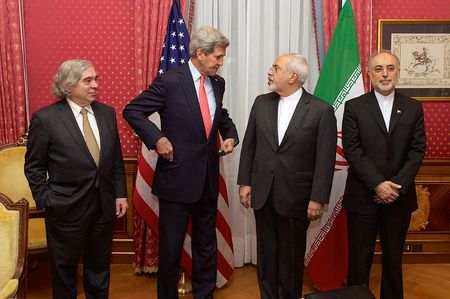Image credit: U.S. Department of State (image is in the public domain)
The last year and a half of negotiations between Iran and six international powers has created a remarkable and historic shift. Not only have relations between the United States and Iran begun to thaw after 30 years of enmity, but it is increasingly looking like the international community will be able to solve the Iran nuclear crisis together.
Under the framework agreement announced on April 2, if implemented, Iran will significantly scale down its nuclear program and allow for unprecedented, intrusive inspections and monitoring. In return, nuclear-related sanctions imposed by the United States and the United Nations Security Council will be lifted.
For some nonproliferation experts, even the steps Iran has already taken would have been enough. Or as those who are celebrating Passover today would say, "Dayenu: It is enough." The interim agreement negotiated in November 2013 froze and rolled back Iran's nuclear program. UN weapons inspectors have had access to Iran's nuclear facilities. By all accounts, Iran was complying with the interim deal. This is owed, in no small part, to a conscious move by President Obama to open his hand to the Iranian nation during his first days in office.
It is useful to remember where we were prior to this diplomatic opening. While President Bush pursued a policy of non-engagement, Iran significantly bolstered its nuclear infrastructure. In 2013, Secretary of State John Kerry summed up that development this way:
In 2003, when the Iranians made an offer to the former administration with respect to their nuclear program, there were 164 centrifuges ... That offer was not taken. Subsequently, sanctions came in, and today there are 19,000 centrifuges and growing.
Thus, the nuclear agreement announced on April 2 is nothing short of a major breakthrough. As many have pointed out, there is still a long way to go between here and implementation. The negotiating parties must write the final accord and then implement it.
Hawks on both sides will work hard to scuttle this success. Sen. Mark Kirk (R-Illinois), for example, who has supported imposing more sanctions on Iran since the interim agreement was announced, compared President Obama to Neville Chamberlain making a deal with Hitler prior to the start of World War II and likened the deal to Nazi appeasement. No doubt, hardliners in Iran stridently oppose the compromises they must make in order to receive sanctions relief.
Compromise, as they say, is when both sides walk away unhappy. Yet, at least for now, there is much to cheer, including that the prospect of war between Iran and the United States just significantly decreased. Just ask well-known television commentator Bill O'Reilly, who said as a tentative endorsement of the agreement:
You don't want a war with Iran. You don't want to bomb that country, because the unintended consequences will set the world aflame. So if you can get something that's decent, you give it a shot. I think that's a legitimate point.
We must not make too much of the thaw in U.S-Iran relations, given the two nations' many opposing interests. But with the historic breakthrough on the nuclear issue, we have been given a taste of what diplomatic engagement can lead to. For now, it is the minimized risk of a nuclear-armed Iran and the attendant strengthening of nuclear nonproliferation norms. For now, it is the diminished risk of war with Iran. So for now, dayenu. With the Easter and Passover season upon us, hope springs eternal.
Susan Shaer is Executive Director of Women's Action for New Directions (WAND). She is celebrating Passover this week with an orange on the Seder plate and will rejoice in the singing of "Dayenu."
